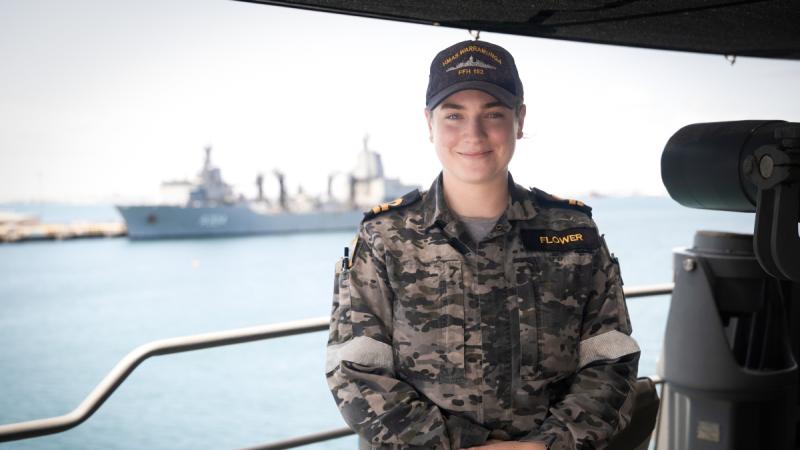31 July 2025
By the time HMAS Sydney arrives back in Australia, more than 110,000 meals will have been served on board to the crew, thanks to one of the busiest departments: Maritime Logistics (ML).
Only 28 people are in the four sub-categories in the department – supply chain, chefs, support operations and medical.
Deputy Maritime Logistics Officer and second-in-charge Lieutenant Christopher McHugh takes great pride in being part of the ML team.
“Being a relatively small department in comparison to the rest of the ship, it takes the entire team to support Sydney’s outcomes,” Lieutenant McHugh said.
The loading of stores aboard the ship requires a daisy-chain of people passing the critical incoming supplies – along with a music speaker to keep pace and morale – with the ML staff directing and filling in gaps in the chain.
“I think there’s a misconception that all I do is ‘stores’, which I most definitely do, but a massive part of the job is planning ahead in the ship’s program while managing both finances and the team,” Lieutenant McHugh said.
On this year’s regional presence deployment, Lieutenant McHugh and his team organised the logistics of international port visits in Japan, Korea, the Philippines and Singapore.
'We fill the niches that other departments can’t easily fill. It does keep us busy on board and means we can develop a lot of extra skills.'
It’s not just the 15,000 items the ML department are accountable for, they also make up 75 per cent of the ship’s medical emergency team (SMET) and manage the ship’s aviation capability when there is no flight on board to do it.
It’s the variety of the role that Able Seaman Aaron Keyes enjoys, back at sea as a hospitality services operator after an out-of-category posting with Australia’s Federation Guard in Canberra.
“When I first joined, I read the fine print and was surprised to see how many different jobs there are in this role,” Able Seaman Keyes said.
As well as his normal role, he enjoys doing his SMET auxiliary role, and is constantly in training with different scenarios during damage-control exercises.
“We fill the niches that other departments can’t easily fill. It does keep us busy on board and means we can develop a lot of extra skills,” Able Seaman Keyes said.
Because of their irreplaceable function, there’s many roles in the department known as ‘ship stoppers’. Put simply, it means without them, the ship wouldn’t be able to leave the wharf.
After being at sea for four-and-a-half months, Lieutenant McHugh can’t wait to reunite with his young family and pet dog back in NSW.
He is also busy getting ready for the next port visits coming up in 2026.


